
Magick in General
• Magic or magick? Either spelling is fine but in Paganism, it’s often spelled with a “k” to differentiate Pagan spiritual magick from the illusion magic that magicians perform for entertainment purposes.
• What exactly is magick? It is making use of the relationships between actions, deities, elements, emotions, intentions, nature, natural cycles, objects, senses, sounds, symbols, and more to raise and direct energy in order to achieve a desired outcome, whether that’s attracting something you want or repelling/dispelling something you don’t want. However, magick is only one aspect of Paganism and certainly not the whole of it, just as attending services at a synagogue isn’t the whole of Judaism. Learn more about Green Witchery.
• Why work magick? To effect a change of any kind in your life.
• 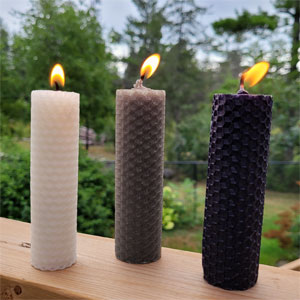 White, grey or black? Magick, in and of itself, is neither good nor bad. It simply is. It’s how you use magick that makes it positive, neutral, or negative. White magick is intended to help and as such, is positive; black magick is intended to harm and as such, is negative; grey magick is neutral or balanced, intended to be neither harmful nor particularly beneficial.
White, grey or black? Magick, in and of itself, is neither good nor bad. It simply is. It’s how you use magick that makes it positive, neutral, or negative. White magick is intended to help and as such, is positive; black magick is intended to harm and as such, is negative; grey magick is neutral or balanced, intended to be neither harmful nor particularly beneficial.
• Regardless of your chosen Pagan path, you should never deliberately cause anyone or anything harm, whether emotional, physical, psychic, or spiritual. As famously stated by Doreen Valiente, “An’ it harm none, do what ye will.” This principle is held by most, if not all witches, not just Wiccans.
• Some faiths, including most Pagan paths, believe that what goes around, comes around, meaning that whatever you put out into the universe will revisit you. Some Pagan traditions posit that it comes back threefold as the universe’s way of teaching people life lessons. So, at the end of the day, whatever good or harm that you put out into the universe will come back to you in some way, shape, or form because magick is an exchange of energies. It may not affect you immediately nor in the same manner but at some point in time, there is a price to be paid for the energies you send out, both positive and negative, whether it’s in working magick or day-to-day life.
Spellcasting in General
• Magick doesn’t guarantee the results that you are after but rather, it increases the probability of your desired outcome happening. So, if you are performing a spell that on something that has a zero percent chance of happening to begin with, a spell will not make it happen. However, if you are interviewing for a position and you already have a 1 in 10 chance of landing the job, an interview success spell can increase your chances of being offered the job but it certainly isn’t a guarantee. It may only double your chances and it that case, you’d have a 2 in 10 chance of being offered the job. Certainly an improvement but not a sure thing. Sometimes, the answer from Goddess, God, and/or the universe is simply “no” and no amount of spellwork will change that.
• 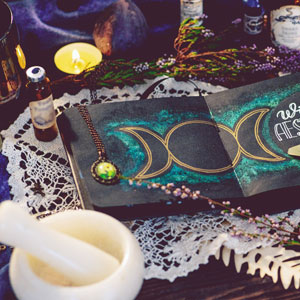 Practice makes perfect so if your magick doesn’t succeed at first, try again and again. It takes time, practice, and effort to improve magickal skills. You didn’t walk the first time you tried so you shouldn’t expect magick to work perfectly right away, either. You need to give yourself time to settle into your craft before deciding a spell or ritual isn’t working for you.
Practice makes perfect so if your magick doesn’t succeed at first, try again and again. It takes time, practice, and effort to improve magickal skills. You didn’t walk the first time you tried so you shouldn’t expect magick to work perfectly right away, either. You need to give yourself time to settle into your craft before deciding a spell or ritual isn’t working for you.
• Magick is not one size fits all. There are, of course, general techniques to spellwork but it is important to experiment with them, adapting them to suit you and your needs. Trial and error will be your best indicator or what works best for you. Don’t worry if it doesn’t conform to metaphysical generalities as your magick is a combination of how all external energies act with and react to your own inherent magickal energies. No two witches are exactly alike.
• In the universe, there are checks and balances to everything, including magick. Since it is an exchange of energies, there must be reciprocation. As such, you can’t simply ask for or conjure up a magickal outcome without giving something back in return. Some spells require an obvious offering to Goddess or God such as some cake or wine or even a candle. Often, however, reciprocity isn’t as clearly defined but you can reciprocate by continually paying forward with acts of kindness and compassion, such as holding a door open for someone or sharing your lunch with a coworker who forgot hers/his.
•  On average, a spell will take effect within a complete moon cycle. Of course, this depends on the spell, how it was written, and then cast. For example. if you’re performing a zap, the energy builds up and is released right away. However, by and large, it takes a bit of time for magickal energies to build and release. Plus, it takes a lot of energy to sustain energies for any length of time. So, longer-acting magick such as some abundance, binding, or protection spells will need to be refreshed regularly, whether monthly, biannually or yearly.
On average, a spell will take effect within a complete moon cycle. Of course, this depends on the spell, how it was written, and then cast. For example. if you’re performing a zap, the energy builds up and is released right away. However, by and large, it takes a bit of time for magickal energies to build and release. Plus, it takes a lot of energy to sustain energies for any length of time. So, longer-acting magick such as some abundance, binding, or protection spells will need to be refreshed regularly, whether monthly, biannually or yearly.
• In spellwork, often less is more. Therefore, it’s best to use a spell that has enough power to give you a desired result but not more as this can backfire on you. Your spell shouldn’t be the magickal equivalent to using a sledgehammer to crack a walnut as casting a broad spell can both work for you and against you. Therefore, it’s important to carefully think through exactly what your desired magickal results are, to determine which spell you will need to work to accomplish this. You see, like electricity, magick will take the path of least resistance if it isn’t guided. For example, if you move to a new city that you’re not familiar with, the magick of a generic friend attraction spell will spread out all over and attract anyone who could potentially be your friend. That’s great if you’re lonely and simply want to meet a lot of people in general but not so much if you only want to meet fellow joggers or dog lovers to walk your pet with.
• A spell doesn’t have to be complex or elaborate nor performed in a ceremony or over an altar to give you your desired magickal outcomes. Depending on the magick being worked, an effective spell can be a quick zap, a simple prayer, or even the preparation of an easy soup recipe.
•  There aren’t many rules in witchcraft, but one of the most necessary is that magick should not be used to alter someone else’s free will. Not only is doing so is rarely successful, it’s considered unethical except in a very narrow range of circumstances. Therefore, if you’re going to perform a love spell, it should be a spell that attracts the right love for you, whoever it may be, rather than trying to compel one specific person to love you. There are very limited exceptions, however. For instance, if someone is harming her/himself and/or others, in which case a binding spell is best as when done properly, it prevents a person from continuing to harm anyone, including him/herself. Learn more about Magick & Free Will.
There aren’t many rules in witchcraft, but one of the most necessary is that magick should not be used to alter someone else’s free will. Not only is doing so is rarely successful, it’s considered unethical except in a very narrow range of circumstances. Therefore, if you’re going to perform a love spell, it should be a spell that attracts the right love for you, whoever it may be, rather than trying to compel one specific person to love you. There are very limited exceptions, however. For instance, if someone is harming her/himself and/or others, in which case a binding spell is best as when done properly, it prevents a person from continuing to harm anyone, including him/herself. Learn more about Magick & Free Will.
• Be very aware that once cast, spells can be difficult to break as events will already be set in motion. As such, it’s much better to be absolutely certain that you really need or want to cast a spell in the first place than it is to try to undo it afterwards. The old adage that “an ounce of prevention is worth a pound of cure” really does apply to magick.
Spellcasting: Who
•  Absolutely anyone can become a witch and cast a spell. A green witch is someone of either sex and any gender identity. While she may be a medical professional, she is equally likely to be a cashier or a police officer or in any other career. He might live in a city apartment, a house in the suburbs, or in a country cottage. She lives alone or with a partner, children, and/or pets. He may or may not have an herb garden. In essence, absolutely anyone could be a witch and chances are, there’s at least one in your neighbourhood or at your place of employment.
Absolutely anyone can become a witch and cast a spell. A green witch is someone of either sex and any gender identity. While she may be a medical professional, she is equally likely to be a cashier or a police officer or in any other career. He might live in a city apartment, a house in the suburbs, or in a country cottage. She lives alone or with a partner, children, and/or pets. He may or may not have an herb garden. In essence, absolutely anyone could be a witch and chances are, there’s at least one in your neighbourhood or at your place of employment.
• Do I need to belong to a coven? No, you don’t. Many witches, if not most, are solitary practitioners. Religion is something that is deeply personal, regardless of which faith you believe in. As such, it doesn’t mean the same thing to everyone nor does it necessarily mean the same thing to every Pagan. Whether you belong to a coven or are a solitary practitioner depends on what works best for you. There is no right or wrong.
Spellcasting: When
•  First and foremost, you need to choose a time when you won’t be interrupted or disturbed by ringing phones or other noises, work, children in your care, pets who aren’t your familiar, etc. Your spells are almost guaranteed to fail if you can’t be 100% mentally present.
First and foremost, you need to choose a time when you won’t be interrupted or disturbed by ringing phones or other noises, work, children in your care, pets who aren’t your familiar, etc. Your spells are almost guaranteed to fail if you can’t be 100% mentally present.
• Also, your frame of mind is very important when you’re working magick. Avoid performing spells when you’re tired, frustrated, angry, hurt, hungry, or otherwise in a negative state. If you do so, your spell will usually fail because you’ll be discharging negative energy instead of attracting the positive energies you need for successful spellcasting. Remember: positive thoughts, positive outcomes.
• Green Paganism is a nature-based faith. As such, magick is worked in accordance to the rules of nature, including following the Earth’s lunar cycles. As a result, many green witches believe that the day of the week or the date on the calendar do not affect magick as they are a part of a man-made system of tracking the passage of time. Therefore, magick can be worked on any day or date, because the universe doesn’t differentiate between a Sunday or a Thursday or the 13th or the 31st.
• Any time is a good time to work magick but different types of magick are more effective during certain moon phases. Therefore, it’s helpful to plan accordingly when possible, for optimal success. For example, if your finances have been suffering, you could approach this magickally from one or more ways during the lunar cycle: during the new moon, you could work a spell to attract a new source of income; during the waxing gibbous phase, you could work magick that will give you a salary raise; and/or during the waning gibbous phase, you might cast a spell to rid yourself of any temptations to spend money unnecessarily.
Spellcasting: Where
• 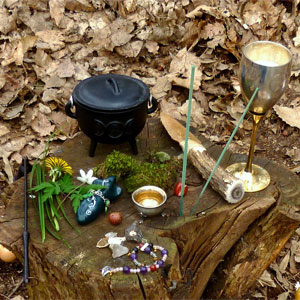 Where can I cast spells and perform rituals? Anywhere. The Earth is your church so just find a quiet peaceful spot, indoors or outdoors, where you feel most comfortable at that particular time.
Where can I cast spells and perform rituals? Anywhere. The Earth is your church so just find a quiet peaceful spot, indoors or outdoors, where you feel most comfortable at that particular time.
• Do I need an altar? No. An altar, a designated sacred space, is not always very practical. You can choose to work magick over an altar all the time, some of the time, or none of the time. You can have a formal altar and/or a portable altar, or no altar at all. It’s your choice, depending on what is most appropriate for you and the magick you are working at a given time.
• Do I need to cast a circle? No. Working magick in a circle is a matter of personal preference, not a necessity. That said, though, working within a circle can keep you more focused and keep you psychically protected while you work magick. As you become more practiced and comfortable with spellwork, you might choose to cast a circle only when it’s necessary to whatever magick you’re working at the time.
Spellcasting: What
•  Missing an ingredient? Check a list of correspondences to find a substitute instead of giving up on a spell. For instance, if one herb is not readily available in your area and another herb that can be substituted is available, switching it out might actually increase your spell’s success, rather than hamper it.
Missing an ingredient? Check a list of correspondences to find a substitute instead of giving up on a spell. For instance, if one herb is not readily available in your area and another herb that can be substituted is available, switching it out might actually increase your spell’s success, rather than hamper it.
• If you are using tools, it is important to use those that are crafted from natural materials rather than artificial ones. First, tools made from natural materials will have inherent magickal properties as well as the ability to hold and/or transfer energy. Secondly, it is better for the environment. For example, left outdoors to the elements, a plastic wand will not decompose for many thousands of years whereas a wooden wand would do so in a year or two.
• Don’t discount a source of information because it is not specific to Paganism. For example, the same properties that can help an essential oil alleviate a headache in aromatherapy may also be beneficial in a healing spell.
• Do not use an ingredient or tool if you have an allergy or intolerance to it, under any circumstances. Instead, check a correspondences list and find an alternate. Substituting one suitable ingredient or tool for another doesn’t mean that your spellcasting will be any less effective or that the outcome will be different.
Spellcasting: How
• 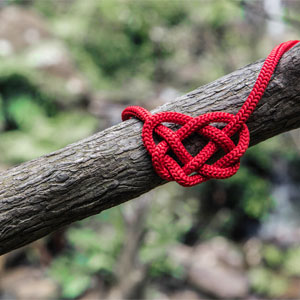 You must be clear about your intentions when working magick as well as focused on the desired outcome while you’re spellcasting. If you are imprecise, you won’t achieve your desired result. Do not be surprised if you make a new friend after a love spell if you weren’t clear that you wanted romantic love, not platonic love.
You must be clear about your intentions when working magick as well as focused on the desired outcome while you’re spellcasting. If you are imprecise, you won’t achieve your desired result. Do not be surprised if you make a new friend after a love spell if you weren’t clear that you wanted romantic love, not platonic love.
• Use only as much magick as you need because more isn’t always better. In nature, including spellwork, there are checks and balances. Using more magick than needed for a particular spell makes it unbalanced and unlikely to succeed. Look at it this way: if you are baking a cake and the recipe asks for 2 cups of flour, you aren’t going to use 10 cups or your recipe will fail. The same applies to magick. If a spell calls for only one orange candle, using ten isn’t going to give you bigger, faster, or better results. Instead, it will cause a magickal imbalance and you will not get the magickal outcome you were hoping for.
• Use your own words when working magick, as they will have more power coming from you than anything anyone else has written. Of course, if a spell is already written the way you would say it yourself, there is nothing wrong with using those words.
• Magick chants typically rhyme. They are often written that way to give them a smoother spoken rhythm. However, rhyming isn’t mandatory when spellcasting. If you are writing a spell, it is your intent, thoughts, and words themselves that have power and are more important than how you specifically say it.
Why Spells Fail
•  You may not have been in a positive frame of mind which is important to a successful outcome. This is a common reason for spells not working as expected and it can happen to anyone for any number of reasons, from the phone ringing to unpaid bills. For example, if you were feeling very hungry, you may not have been focused enough while working your magick so try your spell again after you’ve eaten.
You may not have been in a positive frame of mind which is important to a successful outcome. This is a common reason for spells not working as expected and it can happen to anyone for any number of reasons, from the phone ringing to unpaid bills. For example, if you were feeling very hungry, you may not have been focused enough while working your magick so try your spell again after you’ve eaten.
• Misguided intentions can cause many spells to fail. If casting a love spell, it’s important to ask that you attract the right love for you, not a specific person of your own choosing. If you do the latter, the spell usually won’t succeed so try again with more appropriate intentions.
• Your spells need to be realistic. Magick increases the likelihood of something happening but doesn’t often conjure the impossible. If you are working a spell for something that has zero probability of happening, it won’t be successful. For instance, a spell to get a promotion at work will not succeed if you are not qualified for the position and never had a chance of it being offered to you. However, if it is between you and another equally qualified candidate, a spell will tip the balance in your favour.
• Want vs need. It’s important to differentiate between the two because you will always achieve better magickal outcomes if your spellwork is for something you truly require, no matter how trivial, rather than something you merely want but don’t really need. For example, you may need money to pay your phone bill but you may want to win a million dollar lottery. So if a spell failed, it could be that you were asking for more than you really need.
• You may have selected the wrong spell. If you wanted to protect your home from negative energies and used a cleansing spell, you may have gotten rid of already existing negative energies but have done nothing to prevent them from returning. So, try again with a more applicable spell.
• You may have used a stronger spell than your intention warranted. In spellcasting, more is not necessarily better so only use the minimum magick needed for a desired result. If you want to find a lost ring, cast a spell intended to find only that ring, not everything you’ve ever lost.
• 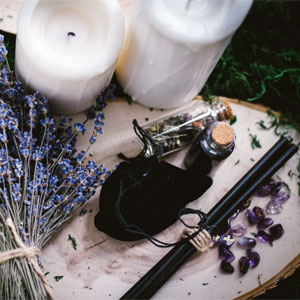 Your spell might have been too “big.” When working magick, it is better to break an intention down into several smaller intentions. For example, if you are having performance difficulties at work, avoid performing an omnibus spell intended to fix the entire situation. Instead, you could work a spell to improve your focus, another one to remove negative energies in your work environment, and one to rid yourself of any distractions during your workday. Individually, any one of these will help boost your performance but all of them will work together to better improve your situation as a whole.
Your spell might have been too “big.” When working magick, it is better to break an intention down into several smaller intentions. For example, if you are having performance difficulties at work, avoid performing an omnibus spell intended to fix the entire situation. Instead, you could work a spell to improve your focus, another one to remove negative energies in your work environment, and one to rid yourself of any distractions during your workday. Individually, any one of these will help boost your performance but all of them will work together to better improve your situation as a whole.
• You may not have performed your spell at a time that would give you the best results. If you worked a spell to improve your psychic abilities during the waxing moon which is a period for decreasing magick, try the spell again during the full moon which is a more auspicious time for such psychic-related magick.
• Not all spells require tools or ingredients. However, your results can be affected if you didn’t have all the necessary equipment for the spell you worked. If your spell specifically states that you need an apple and you used an orange instead, this could have caused it to fail because apples and oranges don’t have the same magickal properties. Also, artificial ingredients do not have the magickal properties of natural products. If you used synthetic lavender fragrance when your spell called for lavender essential oil, it shouldn’t be surprising that the spell failed. So try your spell again after you either get an apple or real lavender essential oil or try to find a valid corresponding substitution.
• You may not have used the appropriate amount of ingredients, especially in a spell with multiple items. More is not always better and this is true in magick as well. If you change the amount or number of an ingredient, this can change the purpose of the spell. So, if a spell calls for 3 leaves or 5 drops of something, use that amount until you are experienced enough to intuit the correct amount that you personally need.
•  You may not have performed your spell during the best phase of the moon or solar cycle for the magick you were working. If you’re doing a ritual for a fruitful garden and perform it during the winter, the magick will have dissipated by the time you need it to work the following growing season. So try again during the spring, when it’s the best time of year to perform fertility rituals.
You may not have performed your spell during the best phase of the moon or solar cycle for the magick you were working. If you’re doing a ritual for a fruitful garden and perform it during the winter, the magick will have dissipated by the time you need it to work the following growing season. So try again during the spring, when it’s the best time of year to perform fertility rituals.
• Trying to alter someone else’s free will for your own gain is not only unethical but will usually fail. For example, performing a spell to make a co-worker you just don’t like quit her/his job will typically not work. Try again with a binding spell to prevent that co-worker from harming anyone, including her/himself. That way, it benefits everyone, not just you, which will make it more likely to succeed. Learn more about Magick & Free Will.
• You may not have given your spell enough time to work. Most magick isn’t spontaneous. It can take time for a magickal energies to build up. So, if you’ve worked a spell, give it an appropriate amount of time for it to work before deciding that the spell has failed.
• In the end, your spell might have failed “for the good of all,” as witches often say. If the spell was one that would alter someone else’s free will or harm them and/or yourself, then it was in everyone’s best interest that it not succeed as you’d intended. In that case, it’s best to simply accept it and move on.
Last but not Least
As I will, so mote it be?
Well, no, not exactly. If it was really that easy to cast spells, perform rituals, pray, meditate, or otherwise conjure up wishes and desires, then absolutely everyone would be happy, healthy, wealthy, and wise. Sometimes, the universe simply says “no.”
What’s important to remember is that green witchery is a rich Pagan path that can help you achieve peace of mind as well as more control over your life. It will also provide you with a greater connection to Earth and nature as well as Goddess, God, and/or the universe. In the end, those are the most desirable of all possible magickal outcomes.
Photos & Images: Nyx · GreenWitch / Elena Mozhvilo · Unsplash · license / Luca · Unsplash · license / pasja1000 · Pixabay · license / Bee Felten-Leidel · Unsplash · license / Thalia Tran · Unsplash · license / Siannan13 · Flickr · CC BY 2.0 · edited / congerdesign · Pixabay · license / Will O · Unsplash · license / Aline Ponce · Pixabay · license / Ksenia Yakovleva · Unsplash · license / Redd · Unsplash · license /
